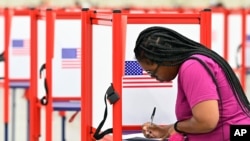Americans heading to the polls or even mailing in their ballots for the upcoming U.S. presidential election in November should feel confident their votes will be recorded correctly, according to the one of the officials in charge of organizing election security.
"I've said it before, and I'll say it again. The 2020 election will be the most secure election in modern history," Chris Krebs, the director of the U.S. Cybersecurity and Infrastructure Security Agency, said Friday.
Krebs, speaking during a Brookings Institution webinar on election integrity, said Russia’s attempts to meddle in the 2016 presidential election served as a wake-up call and that his agency has been able to build on measures put in place for the 2018 midterm elections.
Those measures include the use of sensors to detect possible intrusions into critical computer systems and networks, like voter registration databases, as well as the increasing use of paper-based backups.
He said at least 92 percent of U.S. states now have systems in place to ensure there is a paper record of every vote cast, making it easier to audit election results to make sure no one is able to tamper with the tally. And that number could rise as a growing number of states are expected to turn to mail-in ballots instead of in-person voting because of the ongoing coronavirus pandemic.
And while all that could delay the reporting of final election results, which will require patience from U.S. voters, the results themselves should be secure.
The optimistic assessment stands in contrast with concerns raised by U.S. President Donald Trump, who last month warned on Twitter that the use of mail-in ballots would result in what he described as “the most rigged election” in U.S. history.
Because of MAIL-IN BALLOTS, 2020 will be the most RIGGED Election in our nations history - unless this stupidity is ended. We voted during World War One & World War Two with no problem, but now they are using Covid in order to cheat by using Mail-Ins!
— Donald J. Trump (@realDonaldTrump) June 22, 2020
U.S. Attorney General William Barr has likewise argued that the use of mail-in ballots “absolutely opens the floodgates to fraud.”
But state-based election officials and organizations, like the National Association of Secretaries of State (NASS) and the National Association of State Election Directors (NASED), have pushed back against those claims, arguing there is no evidence to back them up.
And officials like CISA’s Krebs say that despite confidence in their efforts to secure the upcoming election, no one is being naïve.
“We're not fooling ourselves here. There are bad guys that want to do bad things,” Krebs said Friday. “Russia wants to destabilize. China wants a more compliant state. And Iran probably wants a little bit of both.
"We've got the defenses up and we're ready for it," he added.
Despite evidence that Russia scanned U.S. state election systems in the run-up to the 2016 presidential election, U.S. officials said there was no evidence that any votes were changed.
U.S. security officials came to the same conclusion following the 2018 election.
"Identifying and preventing this interference is a top priority of the Federal Government" say @ODNIgov @TheJusticeDept @FBI @DHSgov re preventing foreign interference in #Election2018 #Election2020 and beyond
— Jeff Seldin (@jseldin) October 19, 2018
And Krebs said, at least so far, there is no indication Russia or anyone else has tried to penetrate key election systems.
"We absolutely have better visibility across the networks and we're just not seeing that same level of activity [as in 2016],” he said. “We're not seeing that level of coordinated, determined cyberactivity.”
Instead, U.S. election and security officials say they are more concerned about potential influence operations by adversaries like Russia, much of it aimed at eroding the confidence of U.S. voters.
“They want Americans to despair at the prospect of bringing about change, to despair at the prospect of being able to determine fact from fiction,” Suzanne Spaulding, with the U.S. Cyberspace Solarium Commission and a senior adviser on homeland security at the Center for Strategic and International Studies, told lawmakers Friday.











